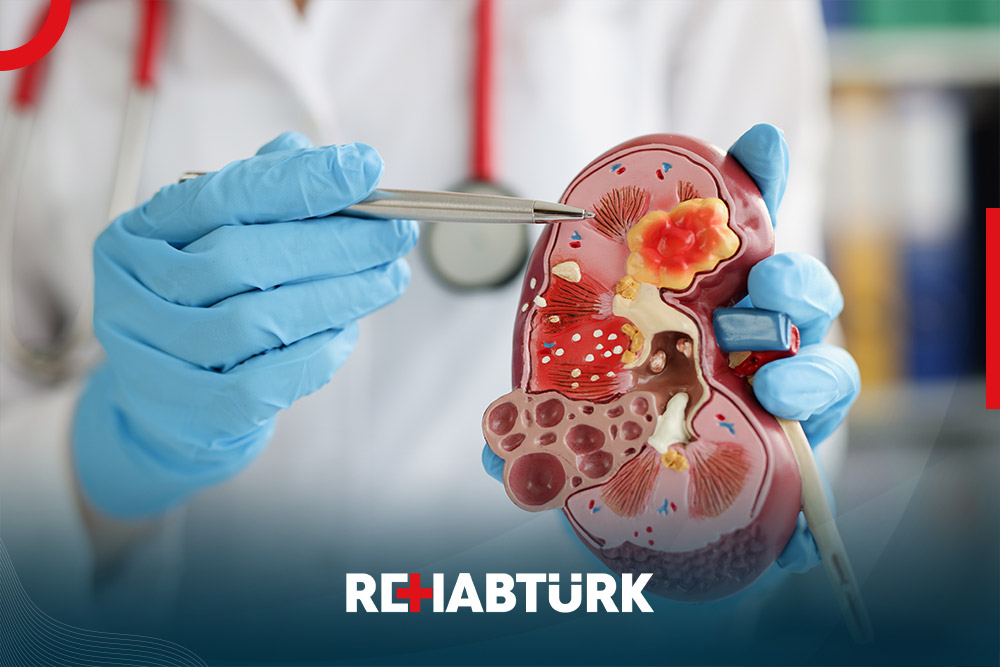Kidney cancer treatment in Türkiye
Kidney cancer: Renal cell carcinoma (RCC) is also called hyperplasia of the kidney, or renal adenocarcinoma. It is the most common type of kidney cancer in adults
What is kidney cancer?
The kidneys are the organs responsible for eliminating waste while also regulating fluid balance in the body. In the kidneys there are small channels called tubules. These tubes help filter blood, remove waste products and produce urine. Renal cell carcinoma occurs when cancer cells begin to grow uncontrollably in the lining of the tubules of the kidney.
Renal cell carcinoma is fast growing and often spreads to the lungs and surrounding organs.
Medical experts do not know the exact cause of this cancer but it is most common in men between the ages of 50 and 70 and it may be diagnosed in anyone of any age as well.
What causes kidney cancer?

There are some risk factors for the disease to occur when:
- Presence of renal cell carcinoma in the family history
- Dialysis treatment
- high blood pressure
- Obesity
- smoking cigarettes
- Polycystic kidney disease (a genetic disorder that causes cysts to form in the kidneys)
- Hereditary von Hippel-Lindau disease (characterized by the presence of cysts and tumors in various organs)
- Chronic misuse of certain over-the-counter medications such as non-steroidal anti-inflammatory drugs used to treat arthritis, fever medications and pain relievers such as acetaminophen
Symptoms of kidney cancer
When kidney cancer is in its early stages, there may not be any symptoms but as the disease progresses, symptoms may include:
- swelling of the abdomen;
- blood in the urine
- Unexplained weight loss
- Anorexia
- fatigue
- vision problems
- Constant pain in the side
- excessive hair growth (in women)
How is kidney cancer diagnosed?
If the doctor suspects that you may have kidney cancer, he or she will ask about your personal and family medical history. He will then perform a physical examination. A lump or lump in the abdomen, or enlarged veins in the scrotum in men can indicate renal cell carcinoma.
The doctor orders a number of tests to get an accurate diagnosis. It may include:
- Complete blood count – a blood test performed by drawing blood from the arm and sending it to a lab for evaluation
- CT scan – an imaging test that allows the doctor to take a closer look at your kidneys to detect any abnormal growths
- Ultrasound of the abdomen and kidneys – a test that uses sound waves to create an image of the organs, allowing the doctor to look for tumors and problems inside the abdomen
- Urinalysis – tests used to detect blood in the urine and to analyze cells in the urine for evidence of cancer
- biopsy – the removal of a small piece of kidney tissue, which is done by inserting a needle into the tumor and withdrawing a tissue sample, which is then sent to a pathology lab to rule out or confirm the presence of cancer
If renal cell carcinoma is confirmed, further tests will be done to see if the cancer has spread and where to find out the stage of the cancer. The stage is determined between (1-4) stages in ascending order of severity. Tests may include a bone scan, positron emission tomography (PET) scan, and a chest X-ray.
About a third of people with renal cell carcinoma have the disease spread at the time of diagnosis.
Available treatments
There are five types of standard treatments for renal cell carcinoma and one or more may be used to treat the cancer.
- Surgery can include different types of procedures. During a partial nephrectomy, part of the kidney is removed. When a total resection, the entire kidney can be removed. Depending on the extent of the disease, more extensive surgery may be needed to remove surrounding tissue, lymph nodes, and the adrenal gland. This is called a radical nephrectomy. If both kidneys are removed, dialysis or a transplant is necessary.
- Radiation therapy involves using high-energy X-rays to kill cancer cells. Radiation can be given externally by a machine or delivered internally using seeds or wires.
- Chemotherapy uses medicines to kill cancer cells. It may be given orally or intravenously, depending on which drug is chosen. This allows the drugs to pass through the bloodstream and reach cancer cells that may have spread to other parts of the body.
- Biological therapy, also known as immunotherapy, works with the immune system to attack cancer. They use enzymes or substances made by the body to defend it against cancer.
- Targeted therapy. It is a new type of cancer treatment. Through it, some drugs are used to attack cancer cells without harming healthy cells. Some drugs work by blocking blood flow to the tumour, “starving” and shrinking it.
Clinical trials are another option for some patients with renal cell carcinoma. Clinical trials test new treatments to see if they are effective in treating disease. During the trial period, the patient will be closely monitored and the patient can stop getting clinical trials at any time.
Outlook after a cancer diagnosis
The outlook after a diagnosis of renal cell carcinoma depends largely on whether the cancer has spread and how early treatment was started. The earlier it is detected, the greater the likelihood of a full recovery.
If the cancer has spread to other organs, the survival rate is much lower than if it was caught before it spread.
According to the National Cancer Institute, the five-year survival rate for patients with renal cell carcinoma is over 70 percent. This means that more than two-thirds of people with renal cell carcinoma live at least five years after their diagnosis.
If the cancer is treated, the patient may still have to live with the long-term effects of the disease, which can include impaired kidney function.
If a kidney transplant is performed, chronic dialysis may be required in addition to long-term drug therapy.
How can I book for kidney cancer treatment in Türkiye?

- Free medical support on the phone: You will have a dedicated representative for your health condition who is always ready to answer your questions.
- Free consultation with a specialist doctor: Your medical representative will consult with a number of doctors and hospitals to find the best possible treatments.
- Free travel visa arrangement: We will contact the embassy in your country to assist you in obtaining a visa to visit Türkiye.
- Free itinerary planning: We will create a schedule for your medical trip to Türkiye.
- Free translation of documents and reports: We will translate medical documents and reports into Turkish on your behalf.
- Free support and monitoring: We will monitor the stages of treatment and be by your side every step of the way.
- Free instant translation: We will be with you during the treatment stages to provide translation between you and the medical team.
- Free accommodation and transportation coordination: We will book accommodation for you and your companions in Türkiye, along with transportation services.
Contact REHABTÜRK doctors for more information about the procedure and to evaluate your medical condition.
